Business Context
In an era of digital transformation and Cloud SaaS applications, customers are bringing in more and more applications and technologies to their IT landscape. To thrive in the ever-competing business landscape, businesses are looking to shorten time to market and accelerate return on investment by a multiple of 10X. In other words, today’s customers want to reap the benefits of automated and integrated business processes in a matter of days and weeks rather than months and years as it was before the cloud era. This is not just a change in perception, but the reality of the changing business landscape in the digitally transformed ecosystem, where end customers are pushing businesses to provide cohesive, integrated, and streamlined business process experiences.
What customers want in the competitive digital world is a trusted partner that they can count on, a blueprint of solutions that can accelerate their return on investment, and a platform that gives them the power of agility to respond to their changing business needs with minimal cost and disruption. This is exactly what Oracle Integration prebuilt solutions offer to customers. Oracle Integration is known for its robust, low code/no code, and resilient capabilities, and is proud to be a leader in the 2024 Gartner® Magic Quadrant™ for Integration Platform as a Service. Oracle Integration is pleased to provide the opportunity for partners to build and deliver prebuilt solutions on the platform. Before getting into details of how partners can build and deliver prebuilt solutions, let’s now dive deep into what are the prebuilt solutions, what features do they provide, and what value do they provide to the partner and customer community.
Introduction to Oracle Integration Prebuilt Solutions
Oracle Integration Prebuilt Solutions (accelerators and recipes) are pre-assembled solutions that bundle all the resources required by the automation solutions, such as the integrations, connections, and lookups, into a single bundle technically known as the Oracle Integration project. Customers can use these prebuilt solutions (accelerator or recipe) to accelerate their journey of automating and integrating their business processes. Oracle Integration currently provides 200+ prebuilt solutions across various vertical and global industry solutions. Oracle Integration customers can easily search for the solutions to their business needs from the Oracle Integration home page and install them with a single click.
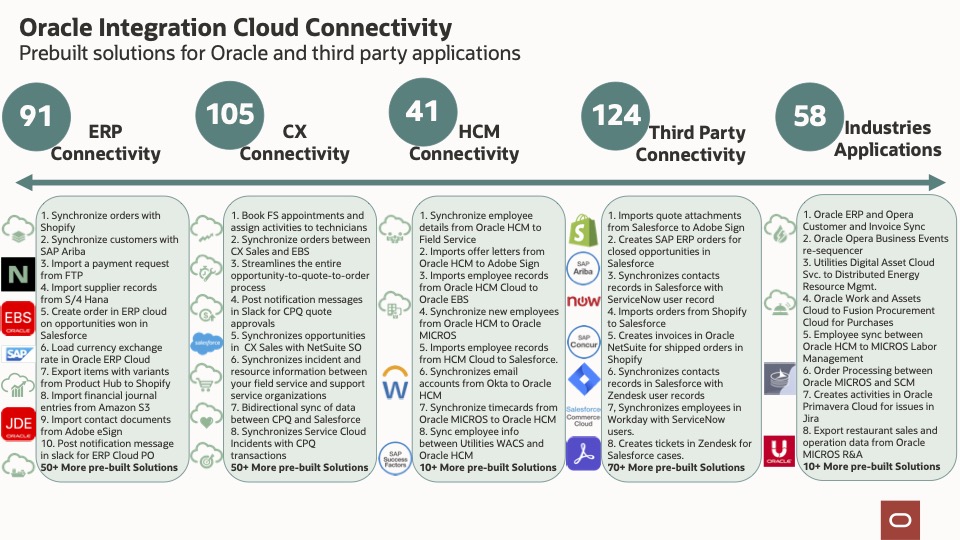
As you can see from above, the Oracle Integration store already supports a large number of prebuilt solutions OOTB. These solutions are spread across diverse vertical and global industry applications. Even though Oracle Integration already has 200+ prebuilt solutions, potential solutions across hundreds of Cloud SaaS applications used by thousands of customers could easily be 2000+ (that is, at least 10X what is available in the store today). In other words, the gap is huge, and with customers looking to accelerate their return on investment, there is a definite opportunity for partners to contribute and monetize their intellectual property by delivering value through the Oracle Integration prebuilt solutions. Before diving into the partner opportunity and key features that enable partners to deliver value, let’s quickly discuss the types of prebuilt solutions supported by Oracle Integration.
Types of Prebuilt Solutions
Oracle Integration supports two types of prebuilt solutions: recipes and accelerators. Both are built on the same Oracle Integration capabilities, and both are packaged through the Oracle Integration project. However, the key difference between them is the story and scope of the solutions. Accelerators are fully supported production-grade, end-to-end solutions. Recipes are sample solutions that demonstrate how a specific pattern or application is integrated on the Oracle Integration platform. Here are the key differentiators between accelerators and recipes:
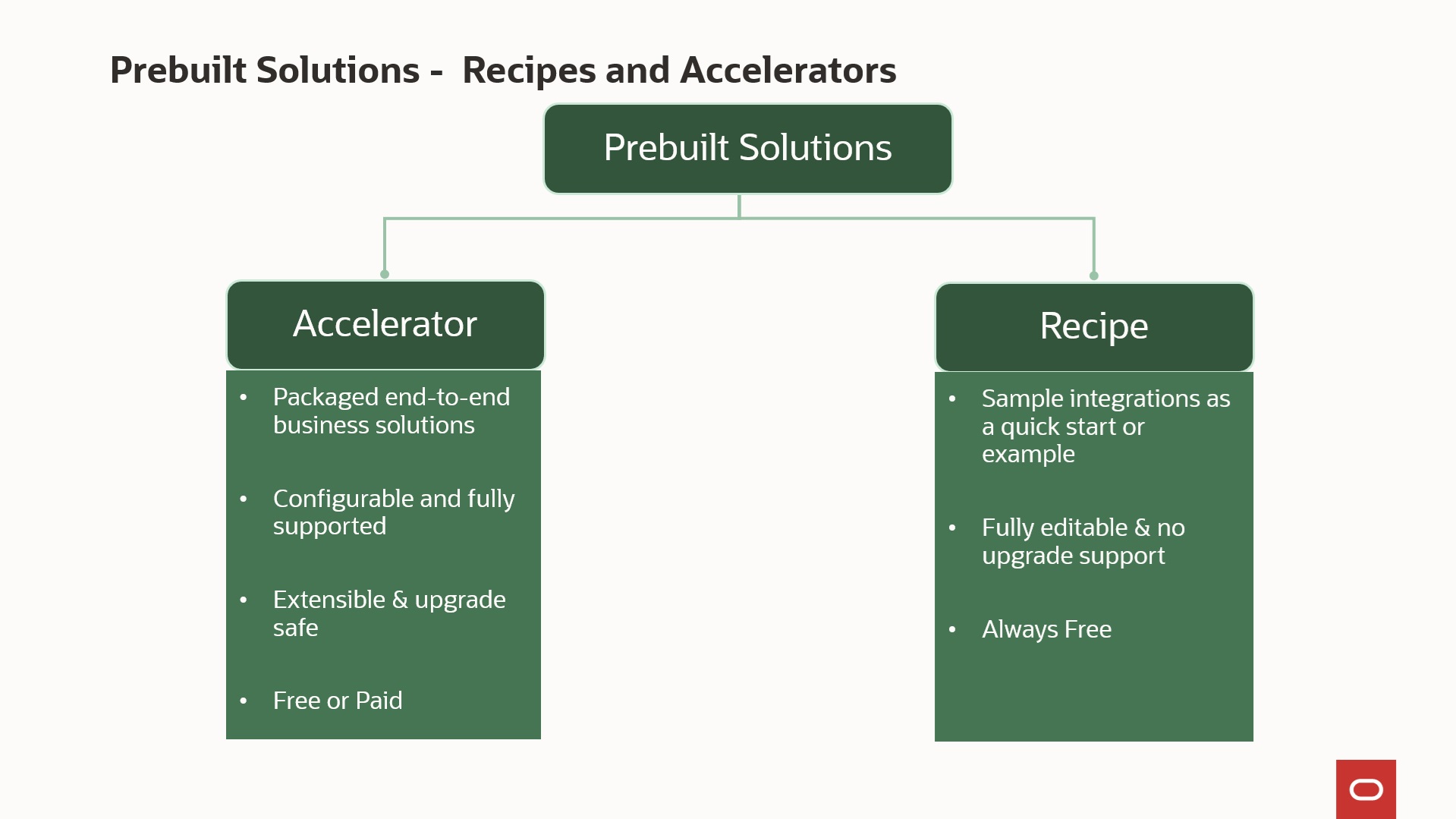
Partner Opportunity
Oracle Integration is opening up this excellent opportunity for partners to produce and publish prebuilt solutions in the Oracle Integration store and showcase their brand on the Oracle Integration home page. This is an immense opportunity for the partners to gain visibility among customers, build their credibility, and stand out in the competition.
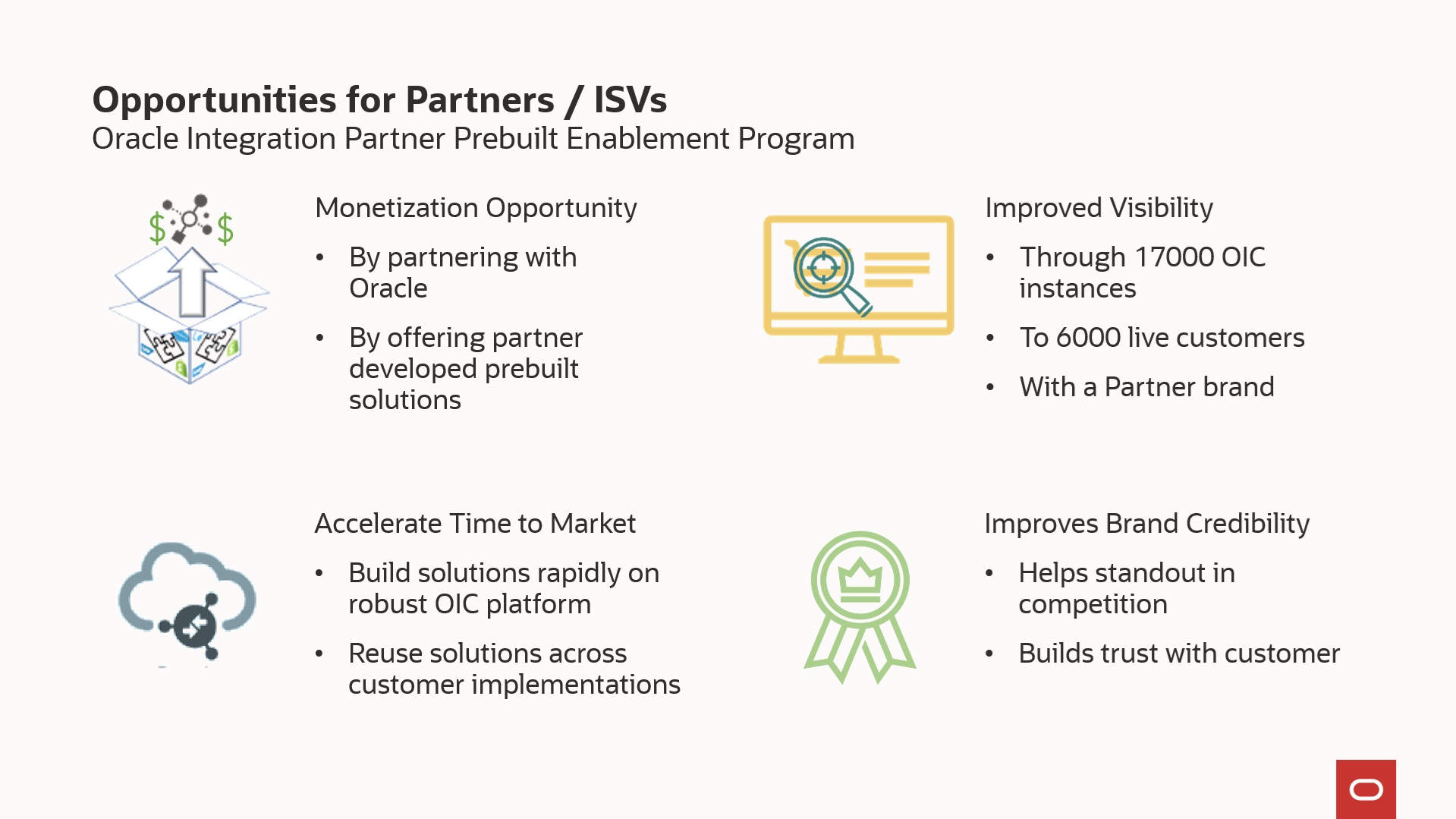
Partners can choose to develop and publish an accelerator or recipe depending on their own strategy and business goals. Accelerators are a great choice for production solutions, can be monetized, and can be reused across customer implementations, resulting in a better return on investment. On the other side, recipes are a sample solution that can provide a quick win to showcase your brand on the Oracle Integration home page and build credibility quickly with Oracle customers. In both cases, it is a win-win for partners because you can showcase your brand, helping you to build customer trust and wins in the market.
So what is the ask here? In a nutshell, the ask is for the partners to develop a solution of their choice, create the required collateral (documentation, terms of use, and so on), and share them with the Oracle Integration team to publish the solution with the partner brand. Let’s quickly talk about the key features that enable the Oracle Integration prebuilt solutions.
Key Features of the Oracle Integration Prebuilt Solutions
Before delving into features of Oracle Integration prebuilt solutions, let’s discuss the key personas in play here: producers and consumers. Producers produce or publish the prebuilt solutions in the Oracle Integration store and consumers consume or install the solution(s) from the Oracle Integration store. As of now, Oracle is the only producer that has published these 200+ prebuilt solutions in the store. However, we are now opening it for partners to publish their own prebuilt solutions.
Producer Persona
Oracle Integration prebuilt solutions support several features that not only enhance the ability of partners as producers to meet their customers’ business needs, but also enhance the overall experience for the end customer, resulting in improved brand trust, more business opportunities, and an edge over competitors. Producers are the ones who produce the prebuilt solutions and publish them in the Oracle Integration store. Let’s first talk about the Oracle Integration prebuilt solution producer features.
The first key feature is Oracle Integration project support for the prebuilt solutions. This feature is turned off by default. To turn it on, you must raise a support ticket to enable the producer (oic.intg.accelerator.producer) feature flag on your Oracle Integration 3 instance. Once the feature flag is enabled, you can easily export the project as an accelerator or recipe from the Oracle Integration project.
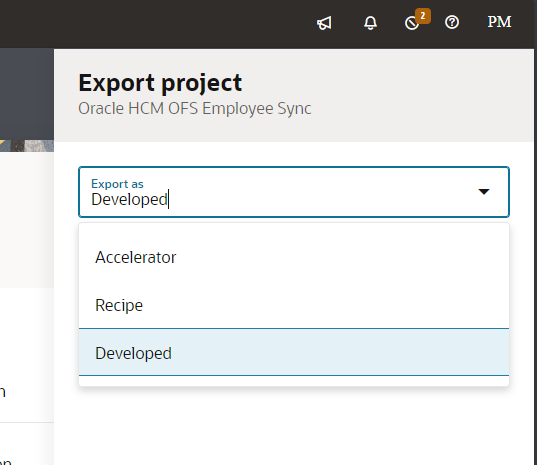
Now that you can export your solutions designed in the Oracle Integration project as an accelerator or recipe, let’s quickly talk about the deployment(s) and their role in the prebuilt solutions. Oracle Integration project deployment allows the producer to package the desired integrations and versions as a cohesive unit to be delivered as a prebuilt solution. To learn more about the Oracle Integration project deployment model, refer to the documentation link.
To publish an accelerator or recipe, as you try to export the Oracle Integration project, you must select the necessary deployment for the prebuilt solution.
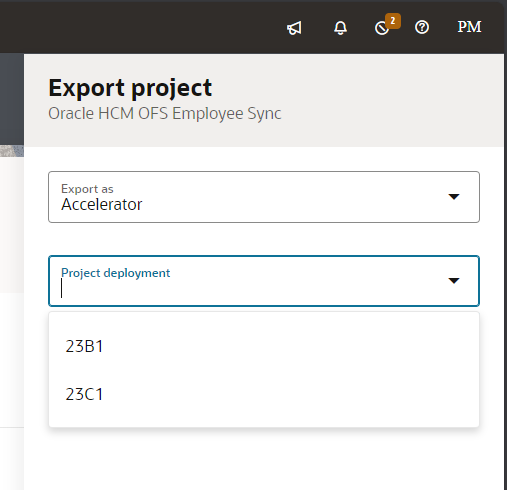
The key points to remember about the Oracle Integration deployments and prebuilt solution version are:
- The deployment name is what consumers see in the Oracle Integration store as a prebuilt solution version.
- You can define the deployment name with any text that resonates with your customer base, such as 24B1, 24C1, and so on.
- The deployment identifier must follow the version name culture of VV.XX.YYYY, where VV is the main version, XX is the minor version, and YYYY is your patch version.
The key benefit of deployment-based Oracle Integration prebuilt solutions is that these Oracle Integration project deployments become the base of the multi-version support for the prebuilt solutions. As a producer, you can incrementally enhance and enrich your solutions, define deployments, and deliver them as a new version of the prebuilt solution in the Oracle Integration store.
Consumer Persona
Consumers are the end customers who are going to consume the solutions from the Oracle Integration store. Oracle Integration prebuilt solutions help customers to jump start their implementation journey through OOTB solutions, resulting in faster time to market and faster return on investments. Let’s now talk about key consumer features that enable customers to leverage the prebuilt solutions on their business automation and integration journey.
The first key feature from the consumer point of view is the seamless installation. Consider the Oracle Integration store like a play store on your mobile phone where you can easily find, install, and/or upgrade the desired prebuilt solution through a single click. This greatly simplifies how customers get access to the Oracle Integration prebuilt solution (accelerator or recipe). The Oracle Integration store is available on the Oracle Integration 3 home page, where 200+ solutions are currently listed and available for customers.
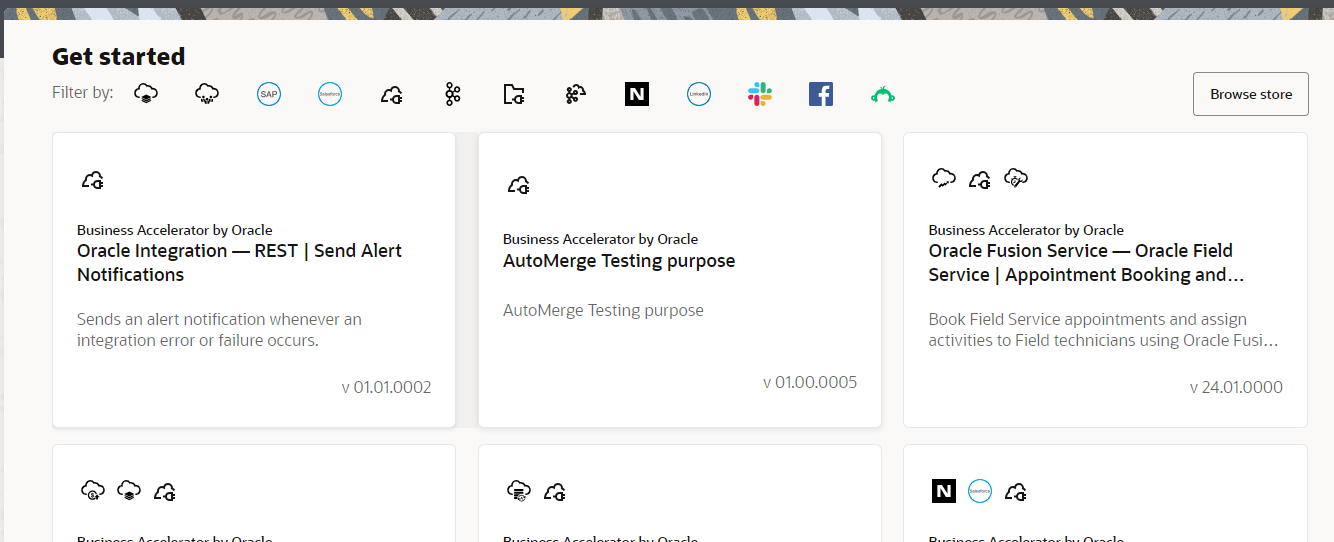
Let’s take an example. Here you can see a solution in the store with the Partner brand highlighted. The tile provides all the required information to the customer, including how to use this accelerator, who built this accelerator, and which version is published. Customers can leverage the same tile to upgrade/get the latest version of the accelerator through a single click.
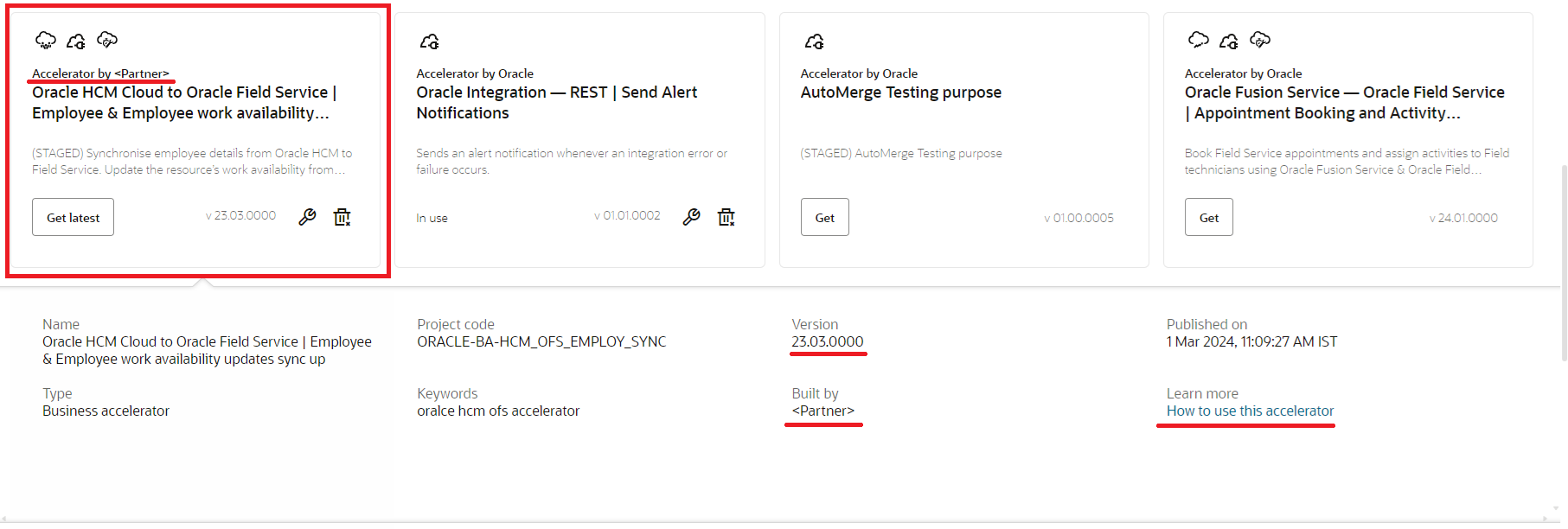
Once the customer installs the prebuilt solution, it appears in a unified workspace called the Oracle Integration project, where the customer can configure, extend/edit, and monitor the prebuilt solution from the same user experience. This experience greatly elevates customer developer productivity because they are now dealing in a contextual workspace where they are configuring, extending, or monitoring solutions.
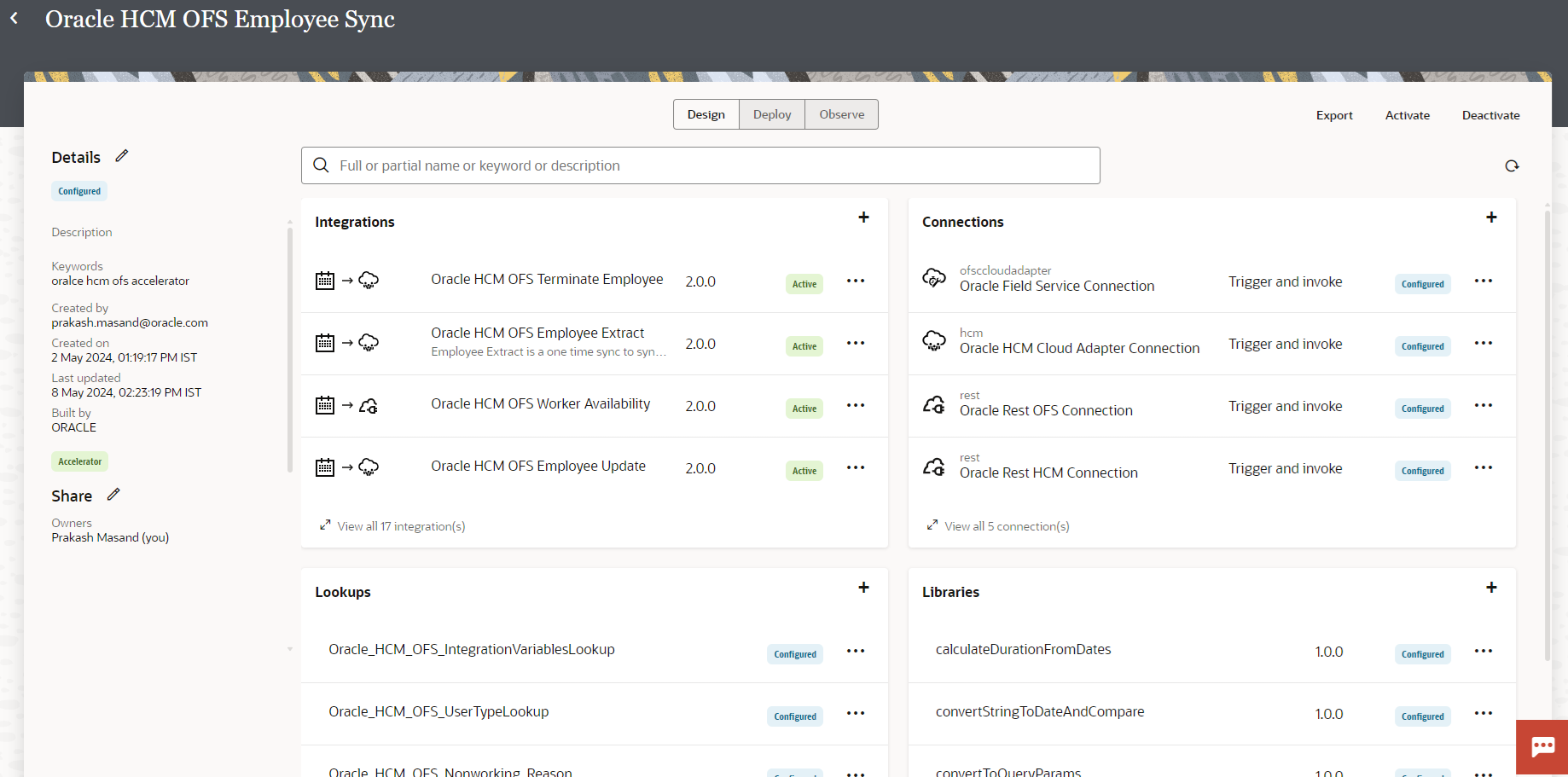
The cherry on top is how the prebuilt solutions are leveraging the Oracle Integration project deployment(s) feature, which enables customers to activate and/or deactivate the prebuilt solution version through a single click. As a producer, you can be sure that the customer is not getting lost in which integration version to activate for which prebuilt version.
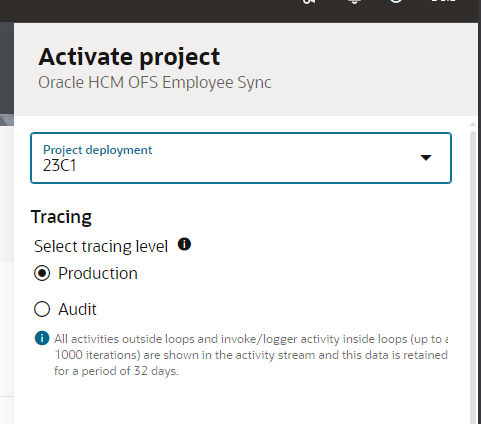
Let’s now talk about the USP of the Oracle Integration accelerators from the consumer perspective, which is the upgrade-safe extensibility. Upgrade-safe extensibility empowers customers to respond rapidly to their changing business needs and gives them the agility required in the changing business landscape. The Oracle Integration extensibility framework helps customers to extend the solution through the Oracle Integration accelerators extensibility framework and at the same time upgrade to new versions of the accelerators without losing extensions.
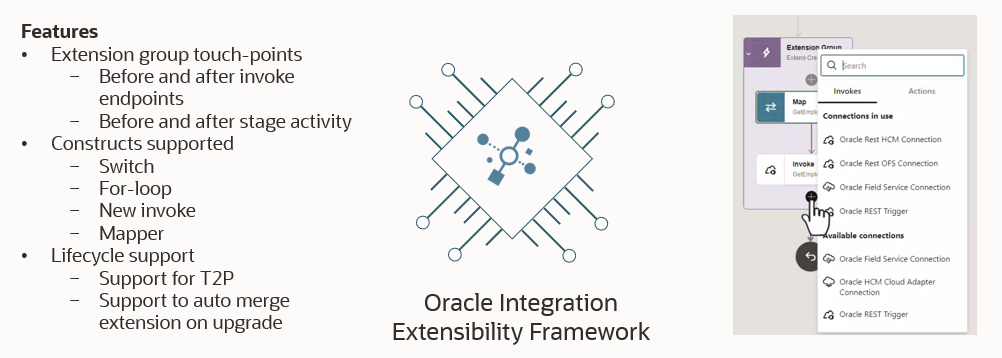
Consider Oracle Integration extensions as the plugins that can be designed by the customer integration developers at the supported touch points. When the customer upgrades to the newer version of the accelerator, these extensions can be automatically merged. The customer only needs to validate the extensions with the upgraded accelerator. Once the accelerator is validated, the customer can easily promote the accelerator from development to production through the export and import of the extended accelerator from the development Oracle Integration instance to the production Oracle Integration instance.
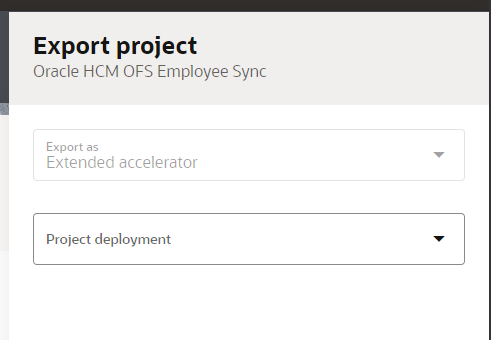
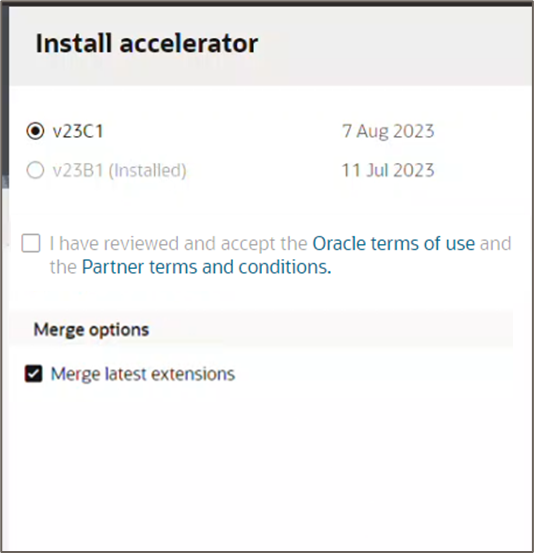
To conclude, the Oracle Integration extensibility framework enables customers to extend the core accelerators to meet their unique business needs and still remain agile on their changing business needs without causing a disruptive cost impact to their businesses.
What’s Next
- Get trained on OIC 3
- Learn more about the Oracle Integration prebuilt solutions BARTA standards
- Reach out to Oracle support to enable the producer feature flag
- Watch Extend SaaS with pre-built solutions – Partner Community Webcast
- Publish your first solution
There is plenty of opportunity for the Oracle partner ecosystem to contribute to the Oracle Integration prebuilt solutions story, showcase their brand and business automation and integration skills, and reap the rewards by standing out from the competition. I hope you are excited about this opportunity. If any partner is interested in publishing the prebuilt solution in the Oracle Integration store, please reach out to Juergen Kress at juergen.kress@oracle.com, Prakash Masand at prakash.masand@oracle.com, or Praveen Morusupalli at praveen.morusupalli@oracle.com.
